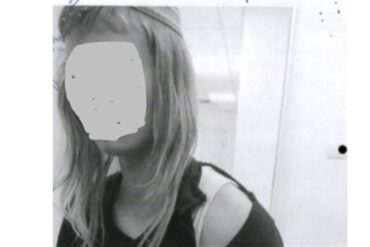“As a woman named Rachel and her husband were mixing mortar, she gave birth to a child. The infant fell into the mortar and was formed into a brick. The woman’s anguished screams pierced the Heavens. The Angel Michael took that brick and brought it up to the Heavenly Throne. On that night (one year later), HaShem destroyed all the firstborn of Egypt.” – Pirkei d’Rabbi Eliezer as quoted in the Katz Passover Haggadah
The above Midrash has always haunted me in a, dare I say, healing and redemptive way. Because when a truth is too hard for humanity to bear, and the depth of depravity is so otherworldly, we know HaShem will hear the cries of those trapped in an impossible, ungodly situation. And we can trust that, eventually, ultimate justice will be done. In our limited human capacity, we can’t fathom the suspension of precious time and what appears to us as agonizing, unendurable delays, but we know to anticipate national and miraculous deliverance. And we accept that somehow seemingly wasted and molested souls are part of that unfathomable Divine process.
Something tells me that hosts of angels collected the heaps of twisted, mutilated, burnt and dismembered corpses of our innocent martyrs and heroes, and lined up on Shabbat Simḥat Torah 5784 (October 7 to some), and the days following, to present the remains at the Divine Throne. And the sapphire bricks formed from those special individuals will help complete what has been a long, challenging and remarkable road to redemption for the nation of Israel. I imagine at the head of that noble but terrifying procession will be the contorted, desecrated, publicly humiliated human forms and violated souls of Shani Louk and so many like her.
When Associated Press photographer Ali Mahmud chose to accompany Hamas terrorists on October 7, it wasn’t likely for an innocent photo-op excursion, as the perpetrators had every intention of making it a violently pornographic one. I imagine after capturing those obscenely evil images on that day, any embedded photojournalist with a conscience would have sat down on the nearest rock and cried his or her very heart out. One would think it would be difficult to live a normal life after that, but I suppose picking up the prestigious Reynolds Journalism Photography Award will help pay the therapy bills.
In reaction to voices and petitions of protest, the Associated Press responded, “While we understand the reactions to the pictures, we also believe that photojournalism plays an important role in bringing attention to the harsh realities of war.”
The wanton rape, kidnapping, beheading and mass slaughter of civilians is hardly “a reality of war” but rather deeds of premeditated, ineffable cruelty. Embedded among butchers, photographer Ali Mahmud managed to capture the “after-the-hunt” sense pride in an abominable conquest that represents the paramount prize for Hamas and serves as a macabre inspiration for a good part of the Israel/Jew-hating world.
But an essential point has been lost on much of that world. Because it’s these very attitudes which consistently backfire and lead to astounding defeats. The violation and mutilation served up by Hamas and their cohorts managed to unify a fractured Jewish nation under the battle cry of “enough!” And it’s certainly not the first time. Rape and kidnapping are morally repugnant, code-breaking acts that, since the dawn of civilization, have always resulted in destruction, bloodshed and wars between families, clans, tribes, kingdoms, nations and peoples. And it’s not so much a call for revenge as it is a demand for a necessary moral recalibration because such outrages cause the universe to teeter on the brink of self-destruction.
For Israelis, the type of overwhelming surprise assault and atrocities we suffered on Shabbat Simḥat Torah doesn’t spell defeat, but rather represents an unbridgeable, tragic rupture where peace in this world becomes an impossibility. There must be some otherworldly rectification. But that will take cries which will pierce the heavens and superhuman efforts of heroic proportion before we merit the required Divine intervention and assistance necessary for any conceivable resolution.
“Should our sister be treated like a whore?” (B’reishit 34:31)
The cry of Yaakov’s sons protesting the kidnapping and rape of their sister Dina echoes again and again and again throughout our history.
But a close reading of the text and rabbinic commentaries in these cases always reveals something above and beyond a modern-day #metoo understanding of the horrific physical, emotional and personal violation ascribed to the act of abduction and rape, as well as the shattering of families. Beyond the rule of law, order and human values which uphold civil society, the TaNaKh transports us to another realm where such a desecration becomes the utmost affront to HaShem, denigrates the integrity of Israel, upsets the order of Creation and shakes the foundations of the world (with commentaries often citing the illicit acts which gave rise the flood in the time of Noaḥ).
“And Yaakov’s sons had come from the field when they heard, and the men were grieved, and they burned fiercely, because he [Sh’khem] had committed a scandalous act in Israel, to lie with a daughter of Yaakov, and such ought not to be done.” (B’reishit 34:7)
Similar language is used as King David’s daughter, Tamar, pleads with her half brother Amnon (David’s son) not to rape her:
“No, my brother, do not force me; for no such thing ought to be done in Israel; do not do this vile deed” (Shmuel II 13:12)
Our sages relate how the daughter of Matityahu Ḥashmonai makes a brazen and astonishing case at her wedding to safeguard her honor and to protect herself and other Judean brides from being raped by the local Seleucid-Greek governor on their wedding nights due to the decree of jus primae noctis (the “right of the first night”). Tradition has it that her shocking display of the naked truth in combination with her principled articulation of the need for armed resistance convinced (forced?) her father and brothers to launch the Maccabean Revolt against the Seleucid-Greek Empire. If you thought Ḥanukah was about a flask of oil, think again. They just don’t/won’t teach this stuff in Hebrew School.
And it’s not just about the women. What about the men? Threatened moral and sexual outrages against men are featured prominently in the moments preceding the destruction of S’dom and again in a horrific episode towards the end of the book of Shoftim. And let’s not forget that according to our sages, Noaḥ was either castrated or sodomized by his son Ham, resulting in Canaan being cursed.
I’m not sure why – perhaps it’s the stigma – but not enough concern has been expressed about what may or may not be happening to our male hostages.
Now while the modern-day human rights activists are rightfully concerned about the various elements that contribute to today’s rape-culture, many are clueless as to why Israel’s reaction and distress level seems so much more amplified and has taken on an intolerable pitch to the point where so many just want to tune it out. After all, many other individuals and peoples have also suffered “man’s inhumanity to man (or woman).” Jews don’t have a monopoly on it. And then it took months before many survivors or returned hostages stepped forward with personal accounts. And that certainly fuelled the doubters. What I am suggesting here is that Israelis on a personal and national level carry unique baggage, responsibility and obligations that go beyond modern Jewish history and the Holocaust. We may very well march to a different drummer and suffer from a sort of selective hearing syndrome that we continue to carry with us.
“…Your brother’s blood cries out to Me from the earth.” (B’reishit 4:10)
In 1979 I participated in a Jewish Federation young leadership mission to Israel. A good number of us 21-year-old burgeoning zealous feminists on the bus confronted the IDF commander leading the tour as to why women could train soldiers but were not permitted to be in combat positions. Without missing a beat, he offered the following sincere response that shut us all up: “The morale of this country couldn’t tolerate the kidnapping, rape and murder of its women soldiers.”
A lot has changed in 45 years but I can still hear those commander’s words and I wonder.
Fourteen years later, in 1993, I helped to establish the Crisis Center for Religious Women in Israel. There were cultural and communication issues of modesty and privacy that could not be addressed by the professionals at state institutions like police stations and hospitals. Both Jewish and Muslim women were unable to express themselves in these contexts after experiencing a sexual assault. A lot has changed in 31 years.
I doubt that much of the world is aware that there are alternative Holocaust Museums which treat the memories of victims with the utmost modesty and do not exhibit photos of naked bodies or immodest displays.
My teacher, the late Rabbi Dr. Sholom Gold, was once discussing why Jews do not advocate cremation. He said the body is akin to a Torah scroll, and just as one properly buries a damaged Torah, so the same must be done with our deceased.
A recent blog at the Times of Israel cited a prayer said by those of the Jewish Burial Society who wash and prepare bodies for burial: “So-and-so the child of so-and-so, we ask your forgiveness for any indignity that we may cause you in the process of the tahara, ritual purification. Everything we are about to do, we do for the sake of your honor.”
Perhaps we should formulate a tefilla to recite before we watch the videos of the horror of October 7 or view the photos that were taken on that day.
It’s a basic Talmudic principle that, “One who embarrasses another in public is as if he is committing murder.”
The world may be unfamiliar with the tenet, but Hamas surely knows it as they have found honor in shaming the other. For them, to humiliate represents victory.
I don’t expect the world to understand our pain. They can’t, because they don’t share in our eternal legacy and unique obligations and relationship with the Creator. It’s so ingrained in our souls that even the most westernized among our people are at a loss as to why the world is just not as disturbed and restless as we are.
But it would be an interesting exercise if our struggling hasbara (public relations) industry would try to remember that they are a covenantal people and that we are experiencing a personal, national, spiritual and historical affront that permeates heart, mind and soul. It’s etched in our very bones and it’s a desecration that we are not permitted to tolerate in our midst.





